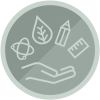Data Literacy at the Cleveland Water Alliance

We’re chatting with STEM practitioners around the country to understand how they are engaging with data literacy in their spaces. For this interview, I’m sitting down with Max Herzog, a Program Manager at the Cleveland Water Alliance (CWA).
We chat about how data is a focal point for CWA’s citizen science and community science programming. Max offers some examples of how educators have informed CWA work and calls educators to action to test out videos, publicly available data sets, and curriculum designed for the Lake Erie basin.
A key piece of advice from Max? “Talk to local experts and community partners to understand the context around the data. It is critical to connect abstract water quality measurements to relevant local surface water issues.”
-----------
Sarah: How do you engage with data and data literacy in your work?
Max: As a Water Innovation Cluster, Cleveland Water Alliance works to accelerate the use of water technologies for positive impact on Lake Erie communities. This includes intensive engagement with in-situ data collection, IoT sensing, remote sensing, community science, and professional research. Additionally, we work closely with K-12 educators to develop curriculum around environmental STEM and innovation for classroom and non-traditional education settings.
Sarah: Are there any programs or initiatives at Cleveland Water Alliance that you’d like to highlight pertaining to data or data literacy? Why are they important?
Max: Kicked off in 2019 as part of Great Lakes One Water (GLOW) (a regional partnership of Great Lakes community foundations), the Smart Citizen Science Initiative has grown into a network that unites and empowers community groups throughout the Lake Erie basin to collect and share water data for the conservation and enrichment of our Great Lake and its watersheds.
By the end of 2021 we will have:
- Created our “Standards” - a framework for credible and impactful volunteer water quality data collection across the Lake Erie Region. Standards are being developed by community science organizations with input from over 30 stakeholder organizations.
- Implemented a common data infrastructure across the region and coded an open web visualization so that anyone can contribute or access Lake Erie citizen science data.
- Innovated the boundaries of Community Science through pilot programs in the fields of data collection technology and STEM curriculum development.
- Established partnerships. While community foundations provided the impetus for this work, it has been spearheaded by a Regional Community of Practice of community partners (currently comprised of 13 active or nascent community science programs).
Sarah: How have you engaged educators in your work?
Max: We have engaged High School teachers across the Lake Erie region (from Detroit to Buffalo) in the development of curriculum resources, which are focused on connecting students to different environmental STEM topics through the lens of Community Science. We have also done a number of hackathons, innovation challenges, and class projects with students at K-12, undergraduate, and graduate levels.
Sarah: Are there ways in which you engage the public in data literacy? How?
Max: We are working to make more water quality data available to the public through tools like our Smart Citizen Science Web Widget.
Sarah: Do you have any data literacy media to recommend? (e.g., blogs, podcasts, YouTube channels, etc.)
Max: We have a series of training videos about low-cost IoT for water quality monitoring that are freely available on YouTube.
Sarah: What advice would you give someone looking to enhance their data literacy practices, in your field?
Max: Talk to local experts and community partners to understand the context around the data. It is critical to connect abstract water quality measurements to relevant local surface water issues.
Sarah: Do you have any "asks" for the reader? Things they should check out or think about?
Max: Get involved in our next hack or your local community science organization! Bring water innovation to your school through our curriculum resources.
---
A big thanks to Max Herzog and the Cleveland Water Alliance for participating in this series!

Comments
Great to read about! We've got this project in the Great Lakes watershed region, as well, I'd like to put on your radar with data viz tools, etc: https://greatlakes.next.fieldscope.org/
Perhaps there is some way to collaborate in the future!